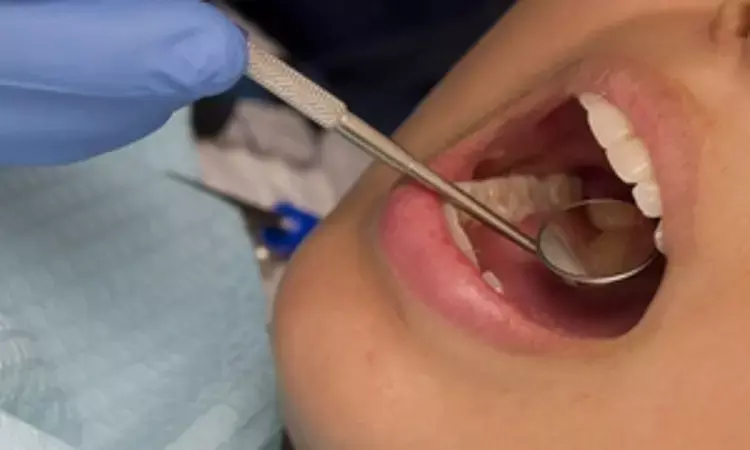- Home
- Medical news & Guidelines
- Anesthesiology
- Cardiology and CTVS
- Critical Care
- Dentistry
- Dermatology
- Diabetes and Endocrinology
- ENT
- Gastroenterology
- Medicine
- Nephrology
- Neurology
- Obstretics-Gynaecology
- Oncology
- Ophthalmology
- Orthopaedics
- Pediatrics-Neonatology
- Psychiatry
- Pulmonology
- Radiology
- Surgery
- Urology
- Laboratory Medicine
- Diet
- Nursing
- Paramedical
- Physiotherapy
- Health news
- Fact Check
- Bone Health Fact Check
- Brain Health Fact Check
- Cancer Related Fact Check
- Child Care Fact Check
- Dental and oral health fact check
- Diabetes and metabolic health fact check
- Diet and Nutrition Fact Check
- Eye and ENT Care Fact Check
- Fitness fact check
- Gut health fact check
- Heart health fact check
- Kidney health fact check
- Medical education fact check
- Men's health fact check
- Respiratory fact check
- Skin and hair care fact check
- Vaccine and Immunization fact check
- Women's health fact check
- AYUSH
- State News
- Andaman and Nicobar Islands
- Andhra Pradesh
- Arunachal Pradesh
- Assam
- Bihar
- Chandigarh
- Chattisgarh
- Dadra and Nagar Haveli
- Daman and Diu
- Delhi
- Goa
- Gujarat
- Haryana
- Himachal Pradesh
- Jammu & Kashmir
- Jharkhand
- Karnataka
- Kerala
- Ladakh
- Lakshadweep
- Madhya Pradesh
- Maharashtra
- Manipur
- Meghalaya
- Mizoram
- Nagaland
- Odisha
- Puducherry
- Punjab
- Rajasthan
- Sikkim
- Tamil Nadu
- Telangana
- Tripura
- Uttar Pradesh
- Uttrakhand
- West Bengal
- Medical Education
- Industry
Extra-short implants as effective as regular-length implants with lower biological complications

A new study published in the Official Journal of the Academy of Osseointegration suggests that extra-short implants had less biological problems, required less time for treatment, and had stronger peri-implant bone crest stability than standard-length implants when implanted in grafted regions at various longitudinal follow-up intervals.
Because of its good clinical performance in clinical practice, dental implants have been routinely used to restore edentulous jaws. The presence of sufficient bone and good osseointegration surrounding dental implants is essential for their success. Unfortunately, the inflammation, trauma, or relatively quick bone loss after tooth removal usually causes the vertical bone volume, one of the most important limiting variables for dental implant placement and effective osseointegration, to be insufficient. In order to compare the efficacy of extra-short implants to standard-length implants in graft locations across various longitudinal follow-up intervals, Polianne Alves Mendes and colleagues undertook this study.
The PRISMA guidelines were followed for conducting a systematic review. Without regard to language or time period, searches were made in the LILACS, Cochrane Library, MEDLINE/PubMed, Embase, and gray literature databases. Two independent reviewers carried out the tasks of study selection, risk of bias (Rob 2.0), quality of evidence (GRADE), and data collecting. A third reviewer was brought in to settle disagreements. Using the random-effects model, data were merged.
The key findings of this study were:
There were found to be a total of 1,383 articles, including 11 from four randomized clinical studies that examined 567 implants (276 extra-short and 291 conventional implants with graft) in 186 patients.
The meta-analysis revealed that both groups experienced comparable levels of losses (risk ratio [RR]: 1.24; 95% CI: 0.53 to 2.89; P =.62; I2: 0%) and prosthetic complications (RR: 0.89; 95% CI: 0.31 to 2.59; P =.83; I2: 0%).
Regular implants with graft had substantially higher rates of biologic problems (RR: 0.48; CI: 0.29 to 0.77; P =.003; I2: 18%) and less stable peri-implant bone in the jaw at the 12-month follow-up (MD: -0.25; CI: -0.36 to 0.15; P .00001; I2 = 0%).
Extra-short implants should be given considerable consideration as a therapeutic option in the posterior area of the jaw since they are linked with fewer biological problems and are just as successful as regular-length implants (with bone grafting).
Reference:
de Pinho DDS MSc student/Leandro Chambrone DDS PhD/Elton Gonçalves Zenóbio DDS, P. A. M. D. M. S. E. de A. S. D. P. V. da C. D. M. S. M. (n.d.). Effectiveness of extra-short (< 6 mm) implants compared to standard-length implants associated with bone graft: Systematic review. Quintpub.com. https://doi.org/10.11607/jomi.9990
Neuroscience Masters graduate
Jacinthlyn Sylvia, a Neuroscience Master's graduate from Chennai has worked extensively in deciphering the neurobiology of cognition and motor control in aging. She also has spread-out exposure to Neurosurgery from her Bachelor’s. She is currently involved in active Neuro-Oncology research. She is an upcoming neuroscientist with a fiery passion for writing. Her news cover at Medical Dialogues feature recent discoveries and updates from the healthcare and biomedical research fields. She can be reached at editorial@medicaldialogues.in
Dr Kamal Kant Kohli-MBBS, DTCD- a chest specialist with more than 30 years of practice and a flair for writing clinical articles, Dr Kamal Kant Kohli joined Medical Dialogues as a Chief Editor of Medical News. Besides writing articles, as an editor, he proofreads and verifies all the medical content published on Medical Dialogues including those coming from journals, studies,medical conferences,guidelines etc. Email: drkohli@medicaldialogues.in. Contact no. 011-43720751


